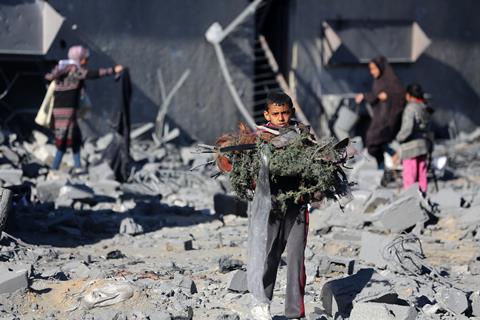The killing and displacement of Gazans must be stopped, says George Pitcher. It’s time for Christians to demand the British government cease supplying arms to Israel

My eye is caught by a full-page advert in The Times; an open letter to the prime minister and foreign secretary, demanding that the UK government call for an immediate ceasefire in Israel’s war on Gaza and halts its supply of arms there. It’s signed, in this order, by Christian Aid, Global Justice Now, Oxfam and War On Want.
Its language is unequivocal: “[W]e have grave concerns about the use of arms supplied by the UK to Israel, in a potential breach of international humanitarian law… Emboldened, [Israel] continues to pursue what amounts to a policy of collective punishment against the people of Gaza and has now rejected the right of statehood for the Palestinian people, the stated policy of the UK government for decades.”
It concludes: “A ceasefire was needed yesterday to stop the slaughter of civilians in Gaza. The UK’s complicity must end.”
Crying out in the wilderness
Of the signatories, only the first one is overtly Christian.
The slaughter of Gazans on a daily basis is an abomination of biblical proportions
The question has to be why that is. Why are Christian voices not more widely heard, more united in a cry, in defence of innocent civilians being slaughtered on a daily basis in Gaza?
To their credit, Anglican bishops have collectively and individually hardened their pressure on Israel since the relatively pusillanimous statement from the House of Bishops at the start of the conflict, triggered by the terrorist atrocities of Hamas on Israel in October 2023. The Pope, too, has been firmly consistent in his demands for ceasefire.
Pragmatism and politics
But the bulk of this effort has been aimed at persuading Israel to desist in its aggression. That is reasonable enough but, in practical terms, it is whistling in the winds of war. Relatively little attention has been aimed at what the aforementioned charities call the UK’s (and by extension the West’s) “complicity” in the attacks.
This is shameful and one wonders why it is so. One reason must be fear of feeding a strong undercurrent of Western antisemitism, which conflates an attack on Israel with global Jewry. A historical sensitivity to this throughout what we might, in this context, call Christendom is understandable.
Nevertheless, the slaughter of Gazans on a daily basis, which the open letter puts at a grotesque 26,000 (the majority being non-combatant women and children), and the displacement of almost two million people, is an abomination of biblical proportions.
More on Israel-Gaza
- I used to think antisemitism was a past problem. Christian reactions to Gaza have changed my mind
- Israel-Gaza war: Don’t ignore what the Bible actually says
- What the Bible says about the Israel-Gaza war
- As a Palestinian Christian, I still believe in Jesus’ call to peacemaking
- As a Christian, I believe a Gaza-Israel ceasefire is needed
Making peace
The threshold of debate over moral equivalence with the Hamas massacres of Israelis has long been passed. The killing has to be stopped. The gospel’s beatitudes have it that peace-makers are blessed, “for they shall be called children of God” (Matthew 5:9). And that holds whether the children are Jewish, Muslim or Christian.
But peace-making isn’t just an irenic activity, conducted in soft calls for ceasefires. Peace-making can be messy, calling political leaders to account for their lack of resolve, their inhumanity in prioritising politics over peace and for weasel words such as “Israel’s right to defend itself.”
Persuading Israel to desist in its aggression is whistling in the winds of war
It’s time for those who profess a religion of peace to turn on their political leaders and demand that they abandon words in favour of pro-activity that is aimed at bringing to an end the horror that is Gaza. Never has it been so true that history will be the judge of these leaders.
Calling for Israeli Prime Minister, Benjamin Netanyahu, to de-escalate his war is a pointless – and, it has to be said, very safe – waste of time. It’s time for those who profess peace to turn on their elected leaders to demand that peace.
Is that a duty for those of Christian faith? Is it consistent with the demands of that faith? And can it work? To invert the three words spoken during a very civil conflict in Europe by Margaret Thatcher, who loathed terrorism in all its forms: Yes. Yes. Yes.






































4 Readers' comments